A peek inside Swiss boarding schools

Private Swiss boarding schools are often known for providing extraordinary facilities and a world class education to the children of the privileged elite. Unlike international day schools, these organisations provide a full-time home for students from around the globe. For many children, this can mean living hundreds or even thousands of miles away from their families, so the schools play a hugely important role in their upbringing. Not many students or parents ever see behind the closed doors of these prestigious institutions. So what are they really like? What is the profile of their average student? Are they hidebound by tradition and looking to their past, or evolving for the future? What kind of education do they provide for their students, and what kind of life are they preparing their alumni for? Alex Marable and Nick Gilbert go behind the scenes and talks to the heads and pupils of a few such schools, to provide a snapshot into their approach to raising the students entrusted to them.
One of the most visible aspects of Swiss boarding schools that sets them apart is the facilities and the surroundings. Students at Institut Le Rosey split the academic year between a manorial estate in Rolle and chalets in Gstaad ski resort in the winter. They play football and rugby on the school’s own pitches, train on its athletics track, play basketball, beach volleyball and tennis, swim in its two pools, ride at the stables, and even row and sail – not to mention the art and music facilities. At Aiglon, nestled in the mountains in Chesières in Vaud, children of all ages are required to conduct a certain number of expeditions each year and will ski multiple times a week in the winter months. Nicola Sparrow, the school’s head says that students can look out at the peaks around the school and count the ones they’ve climbed. She emphasises the value of these adventures, saying “These expeditions are about leadership, teamwork, connections, and about relationships… The students come out very different people. It’s about getting outside and breathing in the air and thinking, reflecting”.
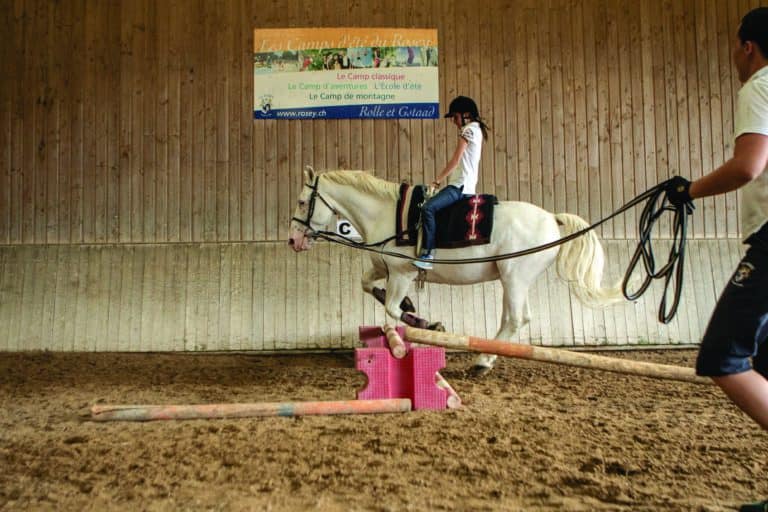
The state-of-the-art facilities and beautiful environs are undeniably defining features of attending these schools, but the teachers focus firmly on the spirit, atmosphere, and learning that these activities inspire and the vital life skills they teach. Students are equipped with a sense of independence, self-reliance and thirst for adventure that hopefully never leaves them. College Alpin Beau Soleil, situated in the Swiss Alps of Villars-sur-Ollon, offers year-round outdoor education including expeditions, camping, mountain biking, and a full winter ski programme. Given the students are at the school permanently for three full terms per year, Stuart White, the school’s principal, sees the huge range of extra-curricular activities as a unique and necessary aspect of the all-round education these schools provide. He says, “although parts of the day are of course spent in classrooms, that’s a relatively small part of the education here, the great thing about being a boarding school is that the learning process never stops.”
The students seem genuinely to value their experiences outside the classroom as part of what makes growing up in these schools so special. A recent graduate of The American School in Switzerland (TASIS) looks back and reflects, “I have gone rock climbing and glacier-walking in St. Moritz, had an exchange programme with TASIS England, studied Dante in Florence, attended the Spanish homestay in Seville, visited CERN, prepared for my IB exams in a monastery in Siena—and these are not even all of my TASIS trips. The amount of enriching experiences is surreal, but the moments that stand out are the bonding and sheer fun of the numerous Ski Adventures.” Undoubtedly, all of these memories and opportunities leave an even more profound impression on the students as their studies.
Those we spoke to are highly conscious of the fact that Swiss boarding schools are often viewed as a network of well connected and fortunate children from around the world. There is much speculation about the atmosphere of elitism that could develop among students as they are closeted away in often remote and beautiful settings, away from the challenges of ‘real’ life. While to outsiders these organisations may look like a mini training ground for the World Economic Forum, in reality, the schools’ approach in relation to this melting pot is intended to achieve a more progressive outcome. Across the board, teachers mention wanting to encourage these children to be outward looking, open minded, and able to find common ground with people who may be from different cultures, look foreign to them, and hail from diverse backgrounds and abilities. About the internationalism of the Beau Soleil’s students Stuart says, “From being here they have exposure to people from lots of different countries and therefore a sense that people are people… You can’t really imagine that until you’ve lived it, and you’ve discovered that the person you’re sharing a room with who’s turned up from a country on the other side of the world to you also supports Barcelona or Japanese pop or whatever it happens to be… The key thing that we’re trying to develop in students is a sense of globalism and for them to be comfortable anywhere.”
TASIS defines itself by the unity that can be found in the diversity of its student body, which represents over 60 nationalities and speaks more than 30 mother tongues. By coming together in this one location, students make a global network of friends and “leave TASIS with links to a vibrant worldwide community that celebrates the unique nature of this remarkable place.” Aiglon’s Head of School recognises a similar dynamic, “For me [what sets us apart is] the diversity of students – not just in terms of nationalities, but also in different academic abilities, interests, personality types – all living together harmoniously, and making lifelong connections. With us, a student will share a bedroom with a different person each term until they get to year 13, and then some will receive their own bedroom, so they learn to adapt to living together. They grow through understanding one another better.”
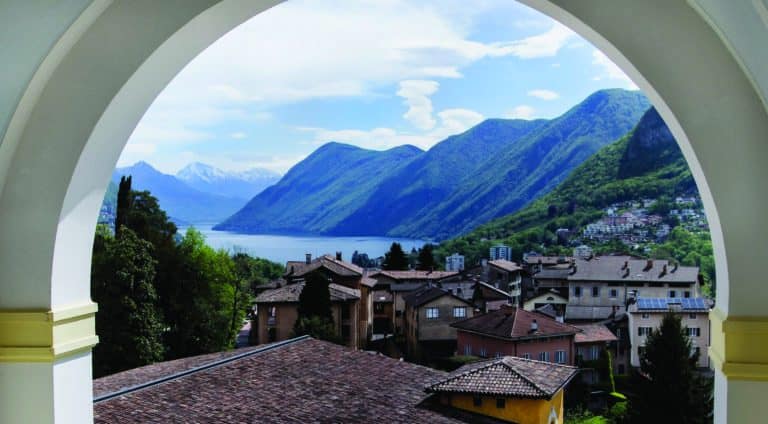
In today’s hyper digital world, young people’s mental health is rightly a hot topic for educators everywhere. By and large the schools have strictly enforced policies regarding mobile phone usage that relates to the age and academic performance of the student, and takes into account the need to be in touch with parents, as well as their need for good rest. Adding to the usual concerns about the impact of social networking, cyber bullying, the challenges of always being contactable and connected, these schools have the additional issues of students being miles away from their families. As a result, the pastoral care systems and processes are hugely important.
Beau Soleil director Stuart sees boarding school as a provider of stability and support for globally mobile families. “Boarding schools can change the relationships parents have with children in terms of the arguments about homework and so on. We promise to have those arguments on your behalf and work through them. This means that when children are at home in the holidays, the relationship you have with parents can be a positive one.”
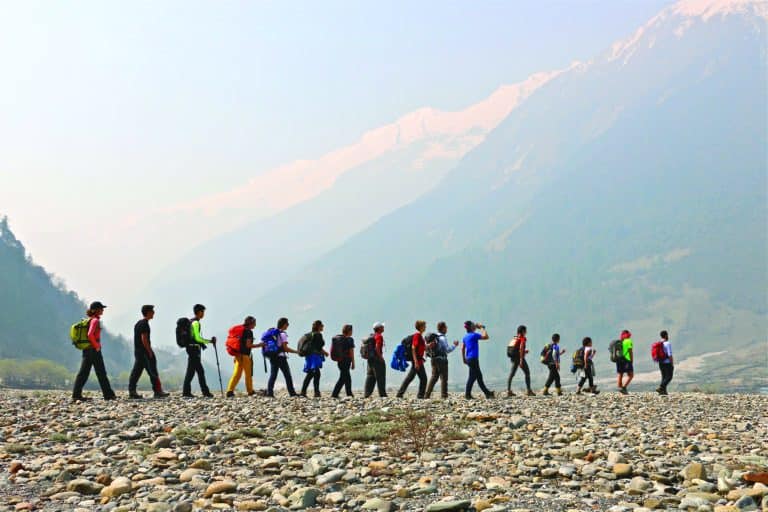
Much of how mental health is managed is also rooted in the fundamental philosophies of the school. For example, at Aiglon, Nicola Sparrow espouses “the guiding principles are balancing the development of the mind, body and spirit. For us, that’s all about that word balance – that’s the most important thing… When we look at our real top performers with the top scores, invariably, they’re the ones that go on expedition every weekend, represent the school at the model United Nations, in debating, sports clubs, and on the ski team.”
Good communication is encouraged between students to help address issues that the staff may not yet be aware of, and to create a culture that promotes openness and sharing. Staff at TASIS view the dormitory as “a student’s temporary home”, meaning “consideration for others and community spirit are vital.” They see that “when co-operation and understanding prevail, residential life becomes the source of meaningful and lasting friendships.”
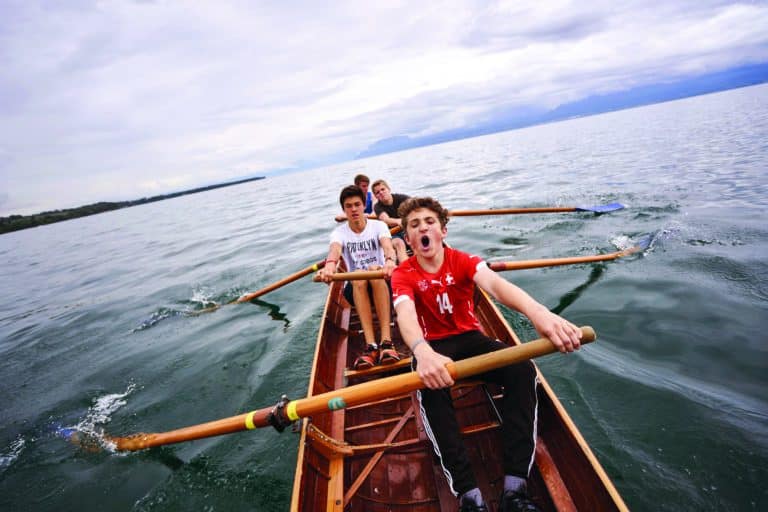
The close teacher-student relationship is as important as the peer to peer relationships between students as a great source of pastoral care. At Le Rosey, Rob Gray highlights that “the teachers live in the same boarding houses as the students”, which means that there’s “constant, daily contact between teachers and students. And that creates a very special understanding between the two.” Christophe Gudin goes on to emphasise that this creates a “deeper and more respectful link with the teachers, and the teachers get to know them better. There’s a more genuine community that extends to the class”.
Just as important in developing the minds of these students is the emphasis that the schools place on instilling a sense of service to others less fortunate than themselves. TASIS has a pioneering Global Service Program that aims to connect high school students across geographic, economic, and social borders through experiences that are designed to build empathy, encourage personal responsibility, and awaken them to humanitarian needs. The end goal is to lead them to a life of active and committed service. Each spring, a small group of TASIS students undertakes a two-week trip with the school hiking through the mountains of Nepal to serve in a Tibetan refugee camp. One student acknowledged, “All of the clichés of these sort of trips being ‘life-changing’ came true, and I realised that while the service that we offer will never create enough of an impact, the trip was an opportunity for our group to change our view on our lives and the opportunities we have.”
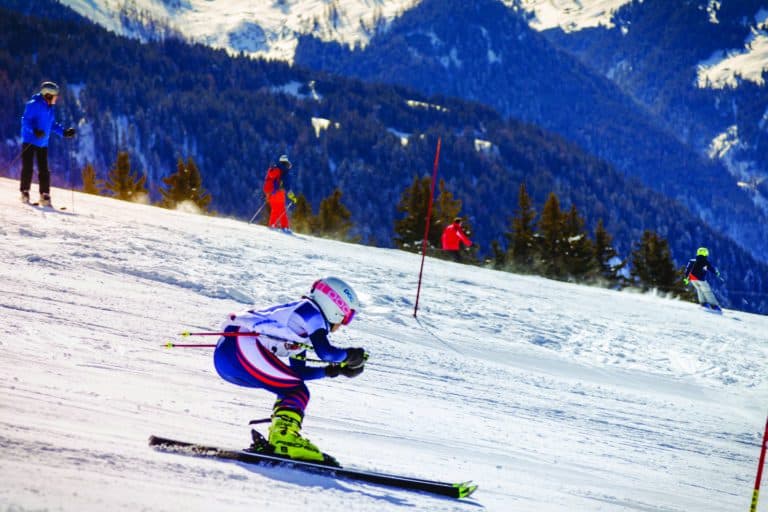
As well as the focus on service, schools such as Aiglon are acknowledging the need to look at the environmental impact of their activities and reducing their footprint. Sparrow says, “As a school, increasing environmentalism has come into the forefront. Not only do we donate money to offset our carbon footprint, but we also know where that money’s going, and how that’s used. Fundamentally, we have started to think, do we really need to go?.” To this end, students also work with local elderly people and refugees in the area. As well as helping people less fortunate than themselves further afield, local charity causes and awareness about the organisations’ carbon footprint are sure to be a large focus for these institutions in the future.
The international aspect is only heightened by the fact that students are all boarding during term time and travel back home for the holidays. Institut Le Rosey, which among 420 students counts 70 countries in its student body, admits only 10% of the intake from any linguistic region and cultural background to maintain cultural diversity. Director General Christophe Gudin says that in comparison to international schools, where students all live in the same area as the school and attend daily, the students at Swiss international boarding schools “live in their home country. They are profoundly Japanese. They are profoundly Colombian. They are profoundly American… They get something from the Swiss atmosphere of the school but they keep their culture.” This impacts the number of languages spoken at the school, and means the school offers over 20 mother tongue foreign language programmes, including English, French, German, Italian, Bulgarian, Russian, Chinese, Japanese, Thai and Hindu. In this way and many others, the education is designed to keep the links with the home countries. This multiculturalism is woven into the teaching methods too, meaning students take lessons in both French and English, and are taught using a range of cultural approaches. For example, they can learn Maths or Geography in English or in French and sometimes in both.
At Beau Soleil, which offers around 12 languages, many of the languages are not only offered as a foreign language, but also as a langue maternelle. They teach French and English curricula, as they are an international school with their origins in the French language tradition.
While the racial and linguistic diversity is impressive, the schools acknowledge they have a continued obligation to reach out and provide opportunities to those from more varied backgrounds. The schools are ambitious in this area. The Le Rosey Foundation has provided scholarships for outstanding students since 2000, while Aiglon has 17 students currently full funded by the generosity of its parents and alumni. TASIS maintains an annual CHF 2,000,000 scholarship and financial aid fund to support students who need it.
To cater for the wide range of students under their care, the Swiss boarding schools provide a wide range of curricula between them: Aiglon, for example, offers IGCSE and the IB Diploma; Le Rosey offers Bilingual IB Diploma in English and French, and the French Baccalaureate; TASIS offer the IB Diploma and Advanced Programme; Beau Soleil offers the High School Diploma, IGCSE, International Middle Years Curriculum and the IB Diploma. Class sizes are small and the teachers feel they can devote time and resources to students as individuals rather than purely teach the curriculum. This means that while the schools do look for certain attributes and academic prowess in the admissions process, they admit students with a range of interests and abilities. The breadth of curricula and extra-curricular activities offered means that there is scope for a student to really find what works for them. The approach across the board seems to be that, given the resources, programmes, and facilities available, the teachers aim to have personal and honest conversations with parents about individual students, in order to enable them to excel. For example, if a student is not particularly academic, but they have the advantage of having lived in many countries and have picked up multiple languages, they may be able to triple the languages they take. There is also ample opportunity to focus on music and art too. If the student struggles with humanities and is focused on science, maths and technology, they can go deep into these subjects. These schools look at a broader picture in terms of admissions criteria, given they are trying to create a very specific style of international community, so often the cultural angle and social skills the student brings to the school will also be taken into account.
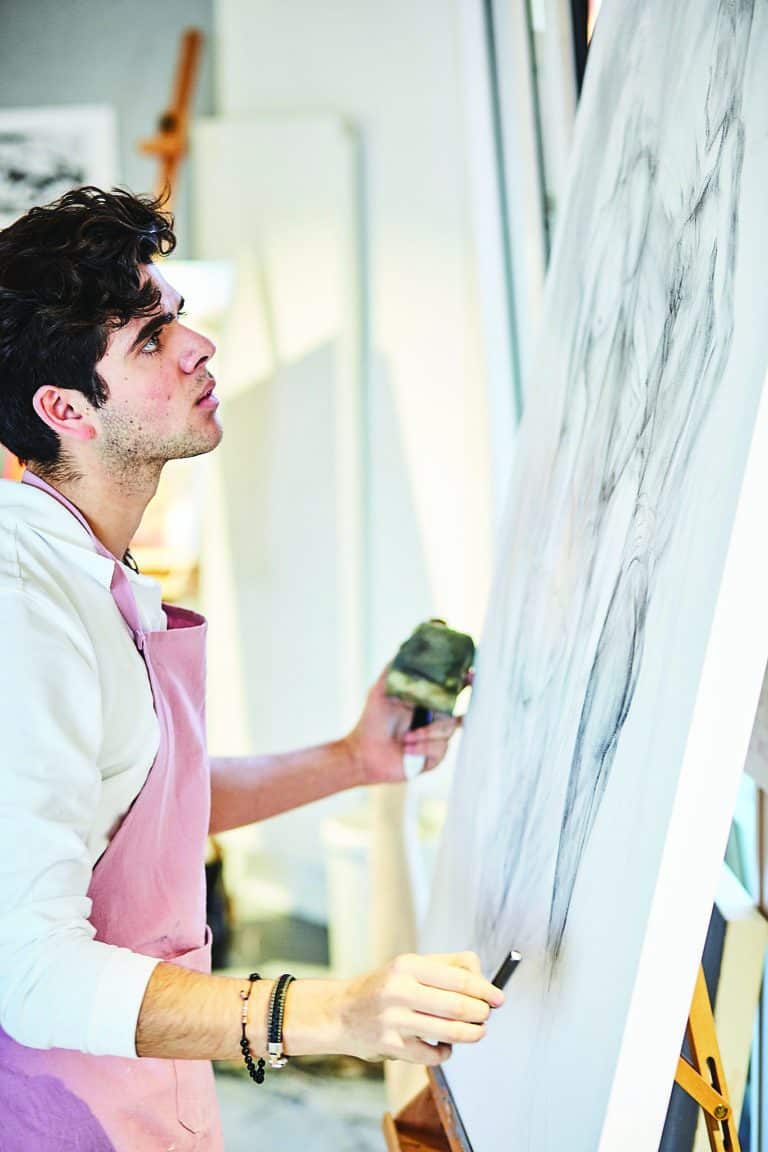
The results of this multicultural and multilingual approach is reflected in where alumni go on to study, live, and work. White says, “It speaks to the hugely varied nature of a Beau Soleil cohort that our students go all over the place. Very roughly 30% to North America (US and Canada), 40% to the UK and 30% to Europe and one or two other parts of the world.” They will also go to a range of academic universities and specialist schools in subjects such as design and art. Aiglon students may even have a spell of military service first if they are Swiss, in which case they can work with the school before or after that to secure a place. Around 45% of Aiglon graduates go to the states and that is increasing. 30% go to the UK, and the rest all around the world. All of the schools have a significant cohort accepted to top schools including Yale, Stanford, Oxford, Cambridge, and LSE, which is impressive. However, the theme seems to be that finding the right fit for a student who has experienced challenges or taken a non-linear or non-traditional path is viewed as an equal success.
The variety and abundance of opportunity that these boarding schools provide is almost unrivalled around the world. The students are often from families whose parents’ careers take them around the world, but they are just as attractive to children of international and Swiss families based in Switzerland either permanently or even for a few years. Having spoken to these educators and their students, one thing is for certain, you would be hard pressed to provide such an engaging and unforgettable educational anywhere else.
More from International School Parent
Find more articles like this here: www.internationalschoolparent.com/articles/
Want to write for us? If so, you can submit an article here: www.internationalschoolparent.submittable.com
